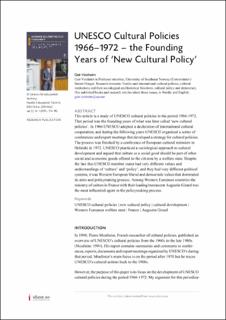UNESCO Cultural Policies 1966–1972 – the Founding Years of ‘New Cultural Policy’
Peer reviewed, Journal article
Published version
Permanent lenke
https://hdl.handle.net/11250/2647857Utgivelsesdato
2019Metadata
Vis full innførselSamlinger
Originalversjon
Nordisk kulturpolitisk tidsskrift. 2019, 22 (1), 174-195.Sammendrag
This article is a study of UNESCO cultural policies in the period 1966-1972. That period was the founding years of what was later called ‘new cultural policies’. In 1966 UNESCO adopted a declaration of international cultural cooperation, and during the following years UNESCO organized a series of conferences and expert meetings that developed a strategy for cultural policies. The process was finished by a conference of European cultural ministers in Helsinki in 1972. UNESCO practiced a sociological approach to cultural development and argued that culture as a social good should be part of other social and economic goods offered to the citizens by a welfare state. Despite the fact that UNESCO member states had very different values and understandings of ‘culture’ and ‘policy’, and they had very different political systems, it was Western European liberal and democratic values that dominated its aims and policymaking process. Among Western European countries the ministry of culture in France with their leading bureaucrat Augustin Girard was the most influential agent in the policymaking process.

